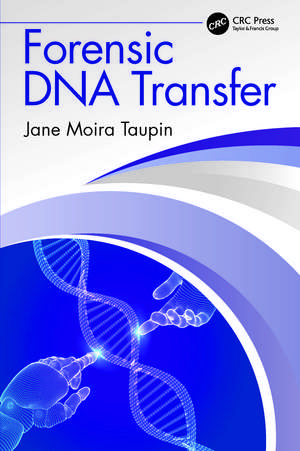Forensic DNA Transfer
Autor Jane Moira Taupinen Limba Engleză Paperback – 10 oct 2023
DNA may be everywhere and anywhere—in homes, at workplaces, during transport, and on personal items including clothing. DNA from a person may be on an object they have never contacted or in a room they have never entered. Concepts discussed in the book include non-self DNA on hands through day-to-day activities, the prevalence of background DNA in the environment and perhaps on the exhibit, the persistence of any DNA transferred, and that a DNA result will depend on these variables as well as recovery techniques. Since DNA may be transferred to an exhibit: (a) during the commission of a crime, (b) before the crime, and/or (c) after the crime through handling, examination, and testing, this book covers various transfer pathways and sources of DNA. Documented cases of inadvertent transfer of DNA resulting in wrongful convictions or the misdirection of criminal investigations are discussed—with an emphasis on contamination mitigation throughout the entire process.
Forensic DNA Transfer examines the additional complexity resulting from non-visible deposits of DNA that impact on sampling and testing regimes. The changing understanding of the composition of purported 'touch DNA' deposits from the skin, including extracellular DNA transported via body secretions, is described. Further, the newer focus on interpreting DNA evidence—using activity level propositions and the rationale and associated issues—is also discussed.
| Toate formatele și edițiile | Preț | Express |
|---|---|---|
| Paperback (1) | 401.53 lei 6-8 săpt. | |
| Taylor & Francis – 10 oct 2023 | 401.53 lei 6-8 săpt. | |
| Hardback (1) | 1000.27 lei 6-8 săpt. | |
| Taylor & Francis – 10 oct 2023 | 1000.27 lei 6-8 săpt. |
Preț: 401.53 lei
Nou
Puncte Express: 602
Preț estimativ în valută:
76.84€ • 83.44$ • 64.55£
76.84€ • 83.44$ • 64.55£
Carte tipărită la comandă
Livrare economică 23 aprilie-07 mai
Preluare comenzi: 021 569.72.76
Specificații
ISBN-13: 9780367746384
ISBN-10: 0367746387
Pagini: 298
Ilustrații: 2 Tables, black and white; 6 Line drawings, black and white; 6 Illustrations, black and white
Dimensiuni: 156 x 234 x 21 mm
Greutate: 0.42 kg
Ediția:1
Editura: Taylor & Francis
Colecția CRC Press
Locul publicării:Oxford, United Kingdom
ISBN-10: 0367746387
Pagini: 298
Ilustrații: 2 Tables, black and white; 6 Line drawings, black and white; 6 Illustrations, black and white
Dimensiuni: 156 x 234 x 21 mm
Greutate: 0.42 kg
Ediția:1
Editura: Taylor & Francis
Colecția CRC Press
Locul publicării:Oxford, United Kingdom
Public țintă
Academic, Professional, and Professional Practice & DevelopmentCuprins
1. Transfer of Matter 2. DNA 3. Trace DNA 4. Trace DNA Sources 5. Medical Exhibits 6. Clothing and Implements 7. Inadvertent DNA Transfer Appendix A – Principles of Forensic DNA Transfer Appendix B – Flawed Logic and Forensic DNA Transfer Glossary of Terminology
Notă biografică
Jane Moira Taupin is an independent forensic science consultant and trainer. She earned her B.Sc.(Hons) in Chemistry and MA in Criminology from the University of Melbourne, Australia. She has attended crime scenes for biological evidence and presented DNA profiling evidence at court in multiple jurisdictions for over two decades. She has coauthored a book on the forensic examination of clothing and is the author of three books on DNA profiling in criminal cases for the legal and forensic communities. She has received several awards in recognition and support of her work from national and international sources.
Descriere
This book provides a guide to the recognition and current understanding of DNA transfer in forensic criminal investigations.
